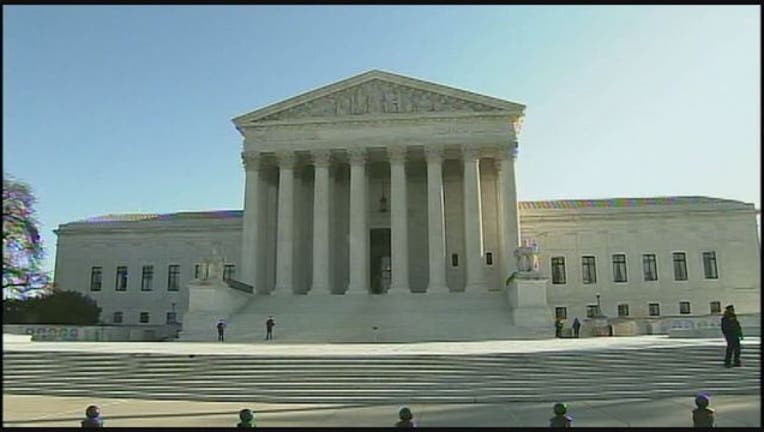Obama health law birth control plan returns to Supreme Court

WASHINGTON (AP) — The Supreme Court is taking up a challenge from faith-based groups that object to an Obama administration effort to ensure their employees and students can get cost-free birth control.
The justices are hearing arguments Wednesday on the sixth anniversary of President Barack Obama's health care overhaul in a case at the intersection of the law, religion and birth control.
The 2010 law is making its fourth Supreme Court appearance in five years.
The issue this time is the arrangement the administration devised to make sure that religiously oriented colleges, charities and advocacy groups do not have to pay for or arrange the provision of contraceptives to which they object, while ensuring that women covered under their health plans still can obtain birth control.
Eight justices are hearing the case, following the death of Justice Antonin Scalia last month. The challengers could find it hard, without Scalia, to attract the five votes they need to prevail.
Contraception is among a range of preventive services that must be provided at no extra charge under the health care law. The administration pointed to research showing that the high cost of some methods of contraception discourages women from using them. A very effective means of birth control, the intrauterine device, can cost up to $1,000.
Houses of worship and other religious institutions whose primary purpose is to spread the faith are exempt from the birth control requirement.
Other faith-affiliated groups that oppose some or all contraception have to tell the government or their insurers that they object.
The groups say doing so leaves them complicit because the government is using their insurers and health plans to provide the contraception.
In 2014, the justices divided 5-4, with Scalia in the majority, to allow some "closely held" businesses with religious objections to refuse to pay for contraceptives for women. That case involved the Hobby Lobby chain of craft stores and other companies that said their rights were being violated under the 1993 Religious Freedom Restoration Act.
The nonprofit groups are invoking the same law in asking that the government find a way that does not involve them or their insurers if it wishes to provide birth control to women covered by their health plans.
Among the challengers are Bishop David Zubik, head of the Catholic Diocese in Pittsburgh; the Little Sisters of the Poor, nuns who run more than two dozen nursing homes for impoverished seniors; evangelical and Catholic colleges in Oklahoma, Pennsylvania, Texas and Washington, D.C., and the anti-abortion advocacy group Priests for Life.
The groups argue that the administration already has carved out exemptions and encourages people who can't get contraceptives through their employers to use the health care exchanges that were created by the health care law and serve millions of people.
The administration contends that tens of thousands of women would be disadvantaged by a ruling for the groups.
The court will consider whether the accommodation offered by the administration violates the group's rights under the religious freedom law. Even if it does, the administration still could show that it has a "compelling interest" in the provision of contraception and that its plan is the most reasonable way, or "least restrictive means" of getting birth control to women covered by the groups' health plans.
Nationwide, eight appeals courts have sided with the administration and one has ruled for the groups. A 4-4 outcome would leave a mess, because different rules would apply in different parts of the country. The Supreme Court takes on cases in order to lay down uniform nationwide rules.

